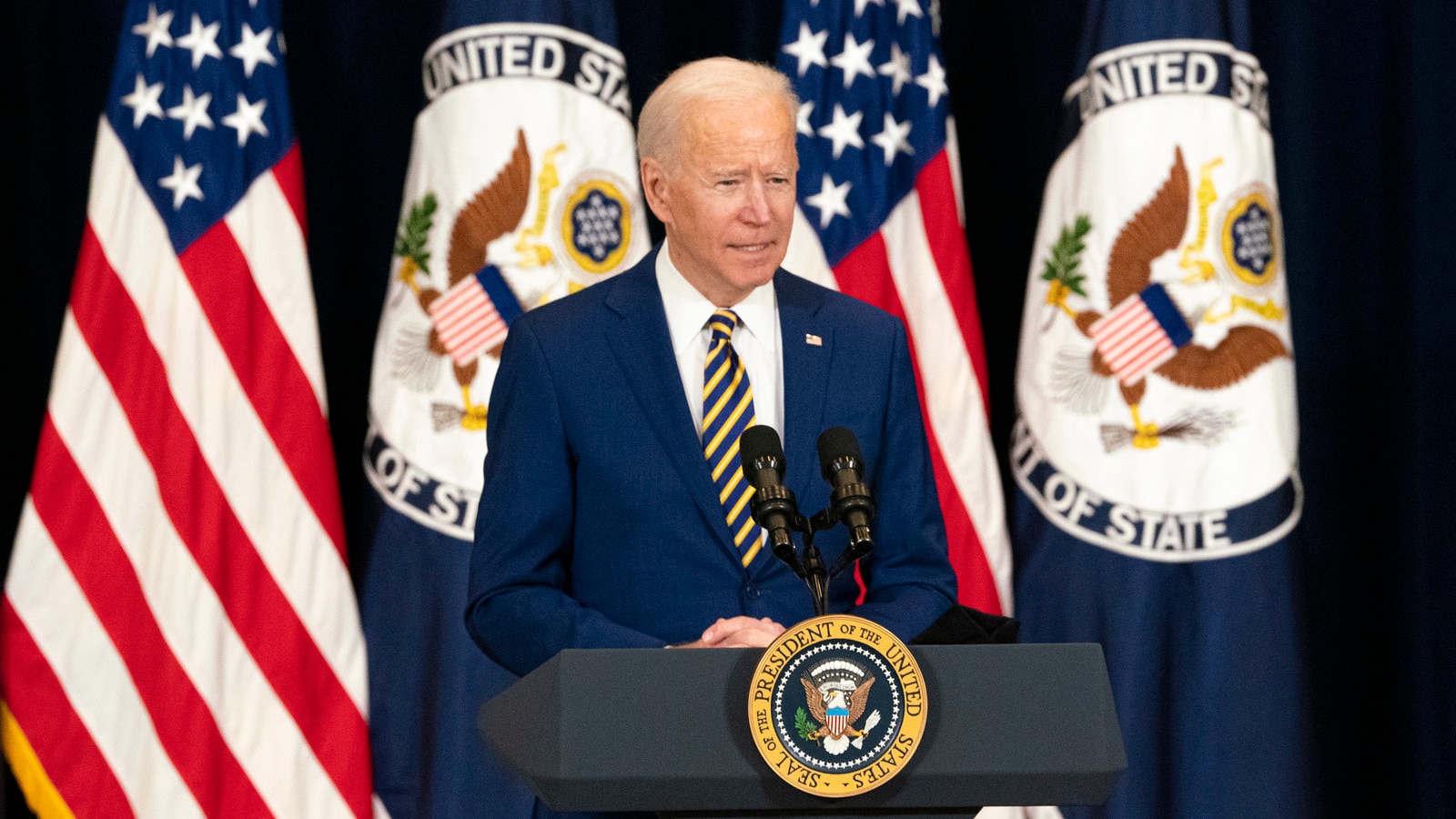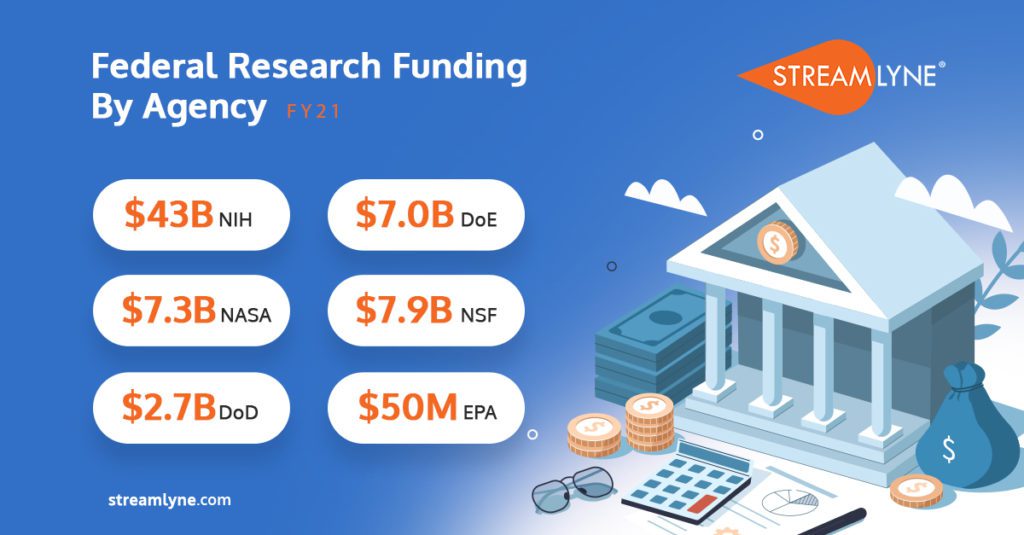
Thankfully, 2020 is behind us and in 2021, research universities and organizations may begin to experience a wave of support. Clearly, COVID-19 related priorities are far from over. However, there is a shifting undercurrent when it comes to consideration of Federal research dollar allocation. For example, there are signals that the government may soon diversify funding efforts. We will see how this plays out as the new Presidential administration takes shape. At this moment, there seem to be positive implications for research institution funding in the coming year and beyond.
In late December, outgoing President Donald Trump signed a $2.3T spending package. With this, a government shutdown was averted. Additionally, this spending package provided FY21 funding to many government agencies. The budget that passed included modest spending increases for federal agencies. Among these agencies were the National Institutes of Health, the National Science Foundation, NASA and the Department of Energy. Had it not passed, it would have been a catastrophic loss of funding and system collapse. So instead, this funding provided some degree of stability.
With this spending in place, there is now bandwidth to turn energy and attention to other valuable research focus areas. For example, there is still much needed funding to benefit our research community. Some efforts are underway, at least preliminarily. For example, the latest funding measure contains a $22B earmark for universities. However, this budget will likely finance relief efforts, as opposed to funding research programs.
What will government research funding priorities be in 2021?
Here is a handy reference chart:
As of now, highlights of the current research-related appropriations for FY21 include:
National Institutes of Health
Among the research areas receiving specific funding are:
- Alzheimer’s Disease
- Cancer
- Brain-mapping
- Tick-borne diseases
- Universal influenza vaccines
- Premature birth
- The use of artificial intelligence in the treatment of chronic diseases.
Budget: $43B.
National Science Foundation
Research funding priorities include:
- Chronically underrepresented groups in science and engineering
- Researchers in states that typically receive less NSF funding. The NSF has also prioritized funding for “greater racial and cultural acceptance and diversity.”
- Preliminary plans to rehabilitate, reuse or replace the site of a recently collapsed radio telescope in in Arecibo, Puerto Rico.
Budget: $7.9B.
National Aeronautics and Space Administration
Areas of research funding include:
- NASA missions
- Science education initiatives ($127 million allocated)
- Exploration of one of Jupiter’s moons
- A system to facilitate a future moon landing.
Budget: $7.3B.
Department of Energy
Prioritized research includes:
- Scientific supercomputing
- Basic energy sciences
- Biological and environmental research
- Fusion energy
- High-energy physics
- Nuclear physics.
Budget: $7.0B.
Department of Defense
- The DoD appropriation will fund basic research.
Budget: $2.7B.
Environmental Protection Agency (EPA):
- Congress has allocated funding to the EPA to perform more extensive research on per- and polyfluoroalkyl substances (PFAS).
Budget: $50M.
Funding implications for research universities and institutions
One significant issue the Biden administration will need to address is support for research universities. Overall funding for research did rise during the four years of the Trump Administration. Looking forward, university researchers hope Washington will find additional funds that impact them. Specifically, universities need assistance in restarting research programs that were halted during the pandemic. In response, many of these universities paused non-COVID-19-related research programs. Now, some of these programs are on indefinite hold.
President Joe Biden has set initial priorities for his administration. These include focus on COVID-19, economic recovery, racism, climate change, health care and immigration. Suitably, universities and research institutions are expected to ask for funding also. There is a case to be made for substantial increase in funding for basic research. This is because the aims of researchers align with the administration’s values and priorities. As such, the request for support should receive a great deal of attention in the coming year.
What’s coming up next in research funding?
The US response to the COVID-19 pandemic has exposed significant gaps. These include shortcomings in medical research, public health and healthcare delivery. For example, look to Centers for Disease Control and Prevention and the National Institutes of Health. Both of these agencies initially struggled to respond to the COVID-19 pandemic. In part, this is because so much of their funding was earmarked for specific programs. Future considerations could include discretionary funding or an emergency budget for such a purpose.
Thankfully, the relief package passed in December enjoyed bi-partisan support. This is something university researchers hope to build upon in future appropriations. At the moment, the Biden administration has indicated that it is working on a second relief package. Along with this, the next budget is being drafted for presentation to Congress this month.
Importance of efficiencies in research program budgets
For many universities and research institutions, introducing new efficiencies into research administration will be key to maximizing their available research dollars. Streamlyne Research has taken all of these these budgetary considerations into account in our pricing model. As such, our is the most value-driven enterprise research administration platform on the market.
We want to work with you to bring your research program into the modern age. We are confident you will start seeing improvements from Day 1. With Streamlyne Research, you can manage the entire research administration process efficiently, all in one place, with integrations into your existing software. This means reducing the time spent on proposal development, award management and compliance. The end result is that your program runs smoothly! From there, you can do your job most effectively.
Let an expert talk you through the process and how we can help. To start, you can now live chat us on this website in the bottom right corner. Or, reach out to a helpful and knowledgeable research administration software professional on our team. We will help you get started, and talk about the implications for your research program.


